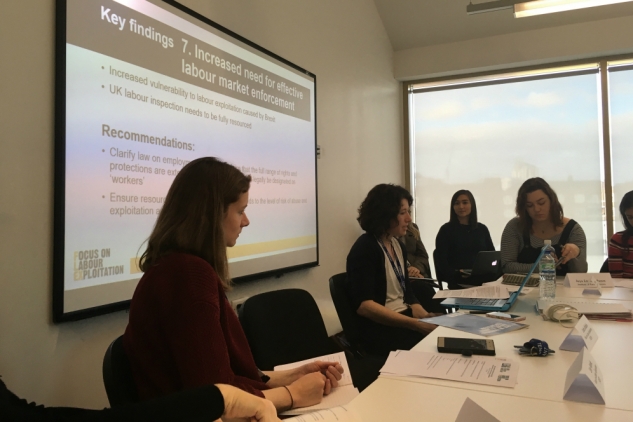
Civil society rallies for action on Brexit and labour exploitation
Last week the Labour Exploitation Advisory Group (LEAG) brought together experts from a broad range of civil society organisations for a half-day forum on Brexit and labour exploitation. As negotiations between the UK and the EU continue, organisations representing women workers, migrant workers, workers with disabilities, and homeless workers joined forces on protecting workers from increased exploitation as a result of Brexit.
Earlier this year Focus on Labour Exploitation jointly with LEAG published a report exposing how Brexit is already causing increased vulnerability to exploitation among EU workers in the UK, as many are being falsely told that they no longer have rights as a result of Britain’s vote to leave the EU. Discussions at last week’s forum added much to this picture: homeless EU nationals being driven to exploitative work due to fear of being deported, workers with disabilities facing increased barriers to entering the workforce and being denied residence, and widespread concerns over the protection of workers’ rights derived from EU law.
The extension of the ‘hostile environment’ towards immigrants in the context of Brexit was high on the agenda for action, as many organisations are currently fighting to protect access to essential services for vulnerable migrants. FLEX’s research has shown that the threat of immigration enforcement deters victims of labour exploitation from coming forward to seek help, and many are concerned that increasing numbers of workers will be at risk following Brexit if restricted immigration places more workers into insecure status. Joint action to call on the Government to implement a firewall between immigration enforcement and labour inspection, and other services, is urgently needed as the increasing involvement of immigration enforcement in modern slavery efforts is being found to act as a real barrier to identification, forcing exploited migrants into the shadows.
Access to advice and support for EU workers was also a key focus as many organisations struggle to meet the increased demand for their advice services in the face of Brexit uncertainty. Clear and accessible information is needed to counter the misinformation put out by unscrupulous employers. FLEX’s research has shown this deliberate confusion is leading workers into abuse and exploitation. Bringing together efforts to inform and advise workers on existing rights and future changes into a central system or campaign that is accessible to all is one proposed solution, but resources and time remain a challenge for organisations already stretched to meet increasing need.
Responding to the challenges ahead as the Brexit process continues requires innovative solutions and new alliances, to strengthen the voice calling for rights and protections against the damaging impact of Brexit on workers and their families. FLEX and LEAG will continue building a coalition of organisations working to empower workers and prevent exploitation both now, and for the future.
